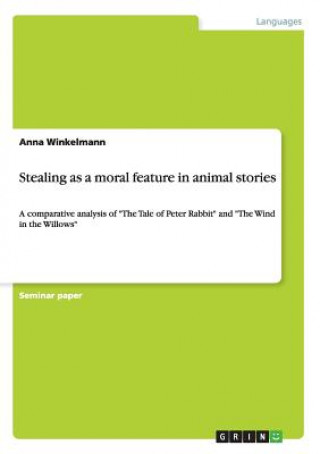
Livrare
Consilier de cumpărături





Nu se pretează? Nu contează! La noi puteți returna bunurile în 30 de zile
 Voucher cadou
orice valoare
Voucher cadou
orice valoare
Cu un voucher cadou nu veți da greș. În schimbul voucherului, destinatarul își poate alege orice din oferta noastră.
Stealing as a moral feature in animal stories
 engleză
engleză
 96 b
96 b
30 de zile pentru retur bunuri
Ar putea de asemenea, să te intereseze


Seminar paper from the year 2012 in the subject English - Literature, Works, grade: 1,3, University of Osnabrück, language: English, abstract: You shall not steal. You shall not lie, neither shall any man deceive his neighbour.(Leviticus 19, Douay-Rheims Bible) This concept has not only long been a convention for religion but also a canon for society. Children have always been taught early that stealing is illegal. Representations can be found in several literary works as for example in Aesop s fables. The issue of moral education was also a current subject during the Victorian era. Especially in the end of the century, when education was made available for nearly all social classes ( Children ), it came to special interest again. As Eric Hopkins argues, religious and moral education was needed if the ever-growing numbers of boys and girls were to be disciplined and turned into conforming members of the new urban society (Hopkins 37). Many books were used to convey a moral sense and works, which did not offer certain moral aspects or which dealt with obscene matters were censored or even banned (cp. Edelstein 1). Although there were no specified rules for censorship of all media, as Robert Justin Goldstein shows by the following quotation, There are no principles that can be defined. I follow precedent. (Goldstein 274), the government went on censoring books if they rated them immoral.So far, most researchers, like Jane Darcy or Lois R. Kuznet, only deal with representations of nature or with nostalgia in Grahame s The Wind in the Willows and like David J. Earp with genetic engineering of plants in The Tale of Peter Rabbit. With my research I want to look from a different angle on his literary work. To investigate further in the research of moral education in books during the late Victorian era, I compare the stealing scene in The Wind in the Willows (Grahame 110-114) to The Tale of Peter Rabbit by Beatrix Potter since both extracts are of special interest for the subject of moralization.During the analysis of the stealing scenes, I want to work on what motivation the characters Peter Rabbit and Toad have to steal and which consequences the characters have to face for their behavior. This was not only an issue of great interest during the end of the 19th century but is still a current subject because just as Pollock and Rainwater quote Ouida (Maria Louise Ramé) The treatment of animals in our power, [ ] both reflects and affects the depths of our collective moral being. (8).
Informații despre carte
 engleză
engleză




 Cum să cumpăr
Cum să cumpăr


















